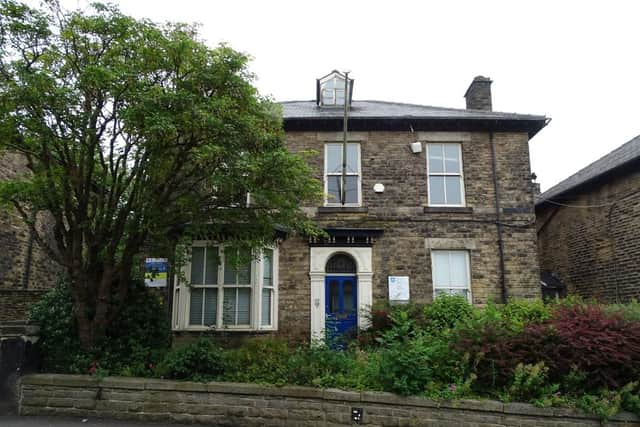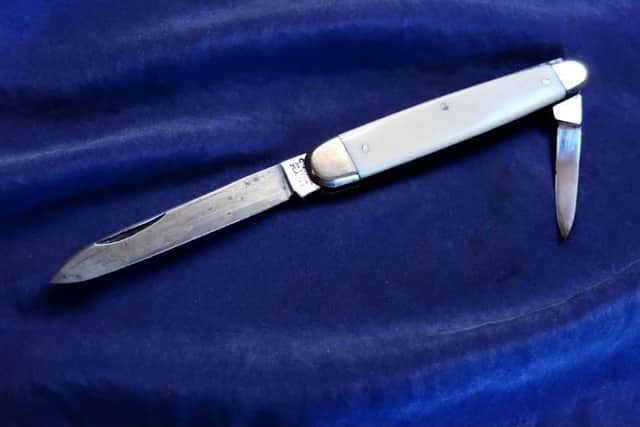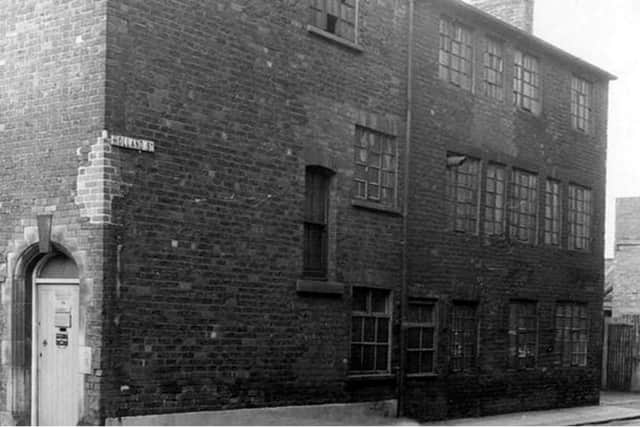‘Del Boy’ Blyde’s name lives on in Sheffield pewter firm
and live on Freeview channel 276
In 1879, this house was the pride and joy of Edwin Blyde, cutlery manufacturer.
In 1879, it did not have a number, but was called Pembroke Villa.
Advertisement
Hide AdAdvertisement
Hide AdThis is because the residences in this, then-well-to-do area were known by name and not numbers as the rest of the working population were.


I think Edwin slightly exaggerated the company’s history.
It was claimed to have been established in 1798.
However, there does not seem to be any proof that that was the case.
Edwin Blyde & Co was set up by two brothers, Edwin & William.


The business was working out of Eyre Street in the city centre in 1860.
Advertisement
Hide AdAdvertisement
Hide AdTheir sister Sarah Ellison Blyde became a partner and the business moved across the city centre to the Howard Works on Howard Street.
However, in 1864 Sarah and William fell out. That’s family for you.
On December 3, the Sheffield Independent carried adverts in which Sarah claimed she had sacked William, while William claimed he was still a working partner.


The argument was sorted out when the firm, for a short time, became Blyde Brothers, Eyre Street.
Advertisement
Hide AdAdvertisement
Hide AdThey proudly proclaimed they were manufacturers of high class cutlery and surgical instruments.
Edwin was known throughout the town as a wheeler-dealer, a bit of a Del Boy.
After W&E Blyde & Co was dissolved in 1865, Edwin started to work as a merchant and cutlery manufacturer, first on Eyre Street and then on Charles Street, also in the city centre, in 1871.
At this time Edwin was pushing 30 and was living in Havelock Street, Broomhall, along with his wife Martha.
Advertisement
Hide AdAdvertisement
Hide AdLater, they both became proud parents of a little boy who they named Joseph.
By 1876, Edwin Blyde & Co was working out of Bow Street, now West Street, as sewing machine makers and dealers.
However, he was still making cutlery at the Charleston Works, on nearby Rockingham Street.
Just three years later, the Charleston Works was moved, lock, stock and barrel to Lambert Street, West Bar.
Advertisement
Hide AdAdvertisement
Hide AdBy 1896, the business transferred again to Orange Street in the city centre.
It was that year that Edwin bought an interest in Brumby & Middleton.
Herbert Bramble Middleton was his partner.
They were listed as Cutlery & Electroplated manufacturers.
They gained a silver mark in 1901 under the name of Blyde & Middleton.
Advertisement
Hide AdAdvertisement
Hide AdHowever, by 1902 the partnership had been dissolved, leaving Edward to run the business as he thought fit.
As ever still Del Boy, in 1905 Edwin was involved in a legal case brought by famous Sheffield silversmiths Mappin & Webb, after he sold cutlery to a London retailer marked Mappin & Sons.
Edwin had bought the mark a few years earlier.
In short, Mappin & Webb were granted an injunction and the mark was never used again.
However, this set back didn’t phase Edwin as he grew wealthy.
Advertisement
Hide AdAdvertisement
Hide AdOn June 17, 1914, Edwin died at his home on Storth Lane, Ranmoor, aged 71. He £7,636 in his will.
Just two years before his death, Edwin had sold the business to Walter Trickett.
Walter produced high quality spoon and forks at the corner of Holly Street and Trippet Lane.
Trickett’s of Sheffield is a well- known brand that has been supplying quality cutlery and tableware to the hospitality industry since 1880, so has more than 135 years of invaluable experience.
Walter Trickett was a member of the Plymouth Brethren .
Advertisement
Hide AdAdvertisement
Hide AdOn August 20, 1926, while preaching on the beach in Llandudno, he collapsed and died.
In his will he left £17,600,
His resting place is in a tomb at Norton Cemetery.
Sometime in the 1940s, the Trickett firm was run by Ronald Trickett.
Stanley, his brother, carried on running Edwin Blyde on Orange Street, after James Furness took over the firm, whose main product was pewter ware.
It was a natural progression for Blyde’s to start producing pewter.
This they did on Orange Street right up to the 1970s.
Advertisement
Hide AdAdvertisement
Hide AdIn 1980, Stanley’s son, Dennis Trickett, moved production to Little London Road, Heeley.
The firm was sold to Jim Spiers and it produced goods until 1989.
The derelict Anglo Works was renovated in 2006 and since then it has been several clubs and bars.
The Trickett name was acquired by Chimo Holdings, which produces some fantastic products, especially its stag work.
It is situated at White Rose Works, 61 Eyre Lane.
Advertisement
Hide AdAdvertisement
Hide AdThe Truro Works of Walter Trickett still stands today and is Grade II-listed.
Edwin Blyde pewter now works out of 51 Catley Road Darnall.
Its website – edwinblydepewter.co.uk – says: “The spur has been the trademark of Edwin Blyde for some 130 years when one of the Blyde family joined the company straight from a cavalry division of the British Army.
“Blyde's history can be traced back as far as the 18th Century when one of its main activities was the manufacture of pewter-ware.
“Blyde`s manufacturing started when steam power and belt driven motors were used, when candle and oil were the only means of light, through the torrid times of World Wars.
Advertisement
Hide AdAdvertisement
Hide Ad“Our progress in the manufacture of finest quality pewter-ware has taken great strides and as one of the leading manufacturers of pewter-ware in the world, we are conscious of our fine heritage and of the city we represent”.
Thanks go to Geoff Tweedale for his research without which the story could not have been written.